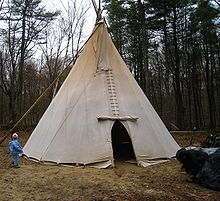Hiram Chase
The Society pioneered twentieth-century Pan-Indianism, the philosophy and movement promoting unity among American Indians regardless of tribal affiliation.
[1] Approximately 50 prominent American Indian scholars, clergy, writers, artists, teachers and physicians attended the historic event, and was reported widely by national news media.
[2] The Society was formally welcomed by university and city officials, and a personal address by the U.S. Commissioner of Indian Affairs, Robert G.
Sherman Coolidge, Arthur C. Parker, Charles Edwin Dagenett, Laura Cornelius and Henry Standing Bear.
[4] Chase addressed the conference on "The Law and the American Indian in the United States," arguing that the decisions of Chief Justice John Marshall and jurist James Kent were correct, that an Indian tribe occupying its own territory secured by treaties was a state with sovereignty over its domestic affairs, and that any other relationship was a violation of the U.S.
"I do not believe that the salvation of the Indian rests with the division of tribal lands into separate ownership and alienable titles, and the thrusting on him, while he is unprepared to receive them, of the rights and duties of citizenship.
"[7] Chase was a supporter of the Peyote faith, and realized it combated alcoholism and attracted the younger, better educated, more acculturated Omaha.
The Native American Church combined Indian and Christian elements, and was popular among the best-educated and most acculturated men among the Winnebago, Omaha and other tribes.





